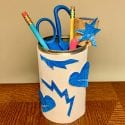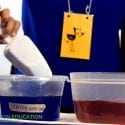
Through riddles, an art project, and small group problem-solving, students gain an appreciation for large numbers and...

Students role-play being pandas in a bamboo forest where habitat fragmentation has occurred due to farming. Students...

Students research an endangered species and create a poster that teaches others about the importance of protecting...

Students identify ways to reduce solid waste by creatively reusing items that might be disposed of. Students...

In groups, students consider several environmental dilemmas and discuss how they would respond. Students will be able...

Through an interactive story, grade 3-5 students experience the pollution of a local river over time and...

Elementary-level reading on communities and the spaces we all share.

In a visual demonstration using water and measuring cups, two students demonstrate the effect birth and death...

Students conduct a composting investigation to observe if and how different materials decompose over time in a...
PopEd Impact
campuses
"The activities not only bring out important content, but they also provide real-world context for environmental, population and sustainability issues. They engage participants in very thought-provoking and critical-thinking discussions.”
Helen de la Maza, Environmental Educator, Irvine, CA

